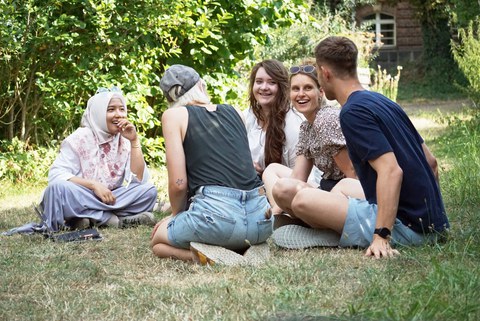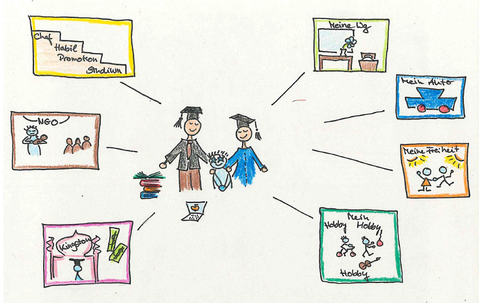Society and community
TU Dresden already offers a wide range of opportunities to support students and teaching staff in implementing inclusive, barrier-free and gender-neutral teaching and employment. The required goals and measures are not new, but require the commitment of everyone, especially at management level, time resources and motivated acceptance and use by all those involved. These offers must be brought to the fore, accepted and expanded. They go hand in hand with an appeal to raise awareness of inequality of opportunity among all TU members so that the required measures can be implemented promptly and sustainably. (see Diversity & Inclusion Strategy)

Students are sitting on a lawn, chatting.
What do we want?
In 2030, all people at TU Dresden will be equally addressed, supported and included through open, respectful, inclusive, barrier-free and gender-neutral communication. People who meet the formal requirements will be able to study and/or work at TU Dresden regardless of mental, physical or temporal barriers. TU Dresden sees itself as a community in which a forward-looking, value-oriented, climate-positive attitude is reflected, defended and implemented in the context of society as a whole. (see Diversity & Inclusion Strategy)
Where do we want to go?
In 2030, TU Dresden is much more than an educational institution:
It is a vibrant, inclusive and sustainable place that promotes the well-being of all university members. Equal opportunities and inclusion are central principles that break down barriers and enable everyone to participate successfully - regardless of their background, abilities or needs. (see Diversity & Inclusion Strategy)
Sustainability is firmly anchored in the university. TU Dresden is actively committed to environmental protection and promotes research and innovation in areas such as renewable energies, sustainable technologies and green building. A comprehensive sustainability strategy links these goals with teaching and other core areas. (see sustainability strategy)
As an important location for lifelong learning, TU Dresden offers a wide range of education and training opportunities that enable continuous skills development in a dynamic world. Students and staff are enabled to react flexibly to change through support in a targeted manner. (see teaching strategy)
The community is at the center: A culture of cooperation, respect and diversity characterizes the way we work together. Flat hierarchies and lean structures promote open communication and consistently adapt degree programs to the needs of students, who also "learn to learn" in them. (cf. university development strategy)
TU Dresden acts as a role model for society, politics and business. Through intensive dialog with the public, research results are communicated to specific target groups and social relevance is made visible. (cf. university development strategy)
How do we achieve this?
(see Diversity & Inclusion Strategy, Teaching Strategy and University Development Strategy)
From 2030, part-time study will be possible at TU Dresden in all disciplines (including the Faculty of Medicine):
- part-time study will be possible.
- the loan of teaching materials (incl. tablet/laptop) is possible, provided they are necessary to achieve the study objective.
- barrier-free access to all teaching buildings.
- it is possible to complete the course within the standard period of study - without having to interrupt/extend the duration of studies, especially in the case of pregnancy/breastfeeding.
- a regular exchange with schools is planned to enable teachers to introduce students to university learning.
- A regular exchange with society, business and politics is planned.
From 2030 there will be:
- a clear obligation to comply with application formalities that are designed to be diversity-friendly.
- mandatory onboarding for managers, in which, among other things, the consequences of non-compliant behavior are pointed out.
- A strengthened reporting structure for non-compliant behavior and a stronger position for those reporting non-compliance as well as a strong and functional sanctions structure.
- an onboarding semester for everyone, in which content on good scientific practice, open communication, dealing with group work and conflict resolution is taught.
others:
- Equal Opportunities Officer, Inclusion Officer, Commissioner for Students with Disabilities and Chronic Illnesses, Ombudsperson and their deputies will be relieved of their other professional obligations on a pro rata basis and provided with financial support and resources in accordance with their needs. You can find a list of relevant persons at TU Dresden here!
- The named representatives are involved in all measures from the outset. Projects require the approval of the representatives.
- The representatives act in close cooperation and with clear commitment with the management level.
Visualized comic about society and community, drawn by Anne Röhle

Many topics concern the students.
